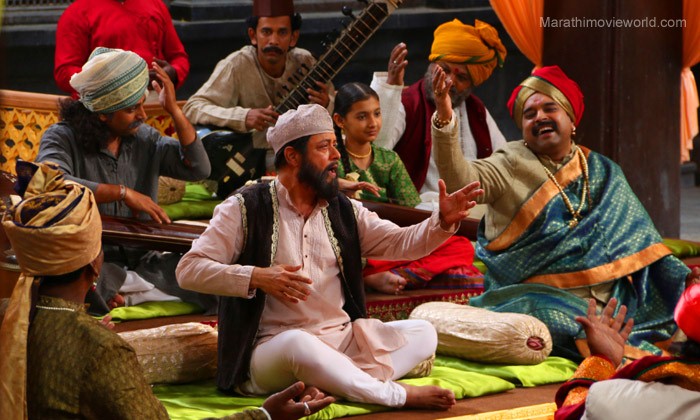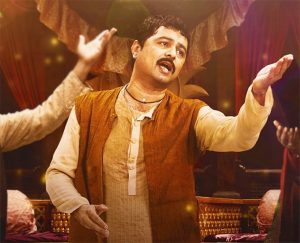Katyar Kaljaat Ghusali
 This film truly has set a milestone in Marathi film industry for terrific acting by Sachin Pilgaonkar, Subodh Bhave and rest of the team; Shankar Mahadevan’s acting debut needs a special mention here! The music is outstanding. The movie consists of great golden numbers and some new tracks effortlessly sung by Shankar Mahadevan, Rahul Deshpande, Arijit Singh and Mahesh Kale. The classical numbers consist of some great harkats and murkis.
This film truly has set a milestone in Marathi film industry for terrific acting by Sachin Pilgaonkar, Subodh Bhave and rest of the team; Shankar Mahadevan’s acting debut needs a special mention here! The music is outstanding. The movie consists of great golden numbers and some new tracks effortlessly sung by Shankar Mahadevan, Rahul Deshpande, Arijit Singh and Mahesh Kale. The classical numbers consist of some great harkats and murkis.
The movie is based on the 45 years old, everlasting play of the same name, in which music was composed by Vasantrao Deshpande. It is now brought alive by Shankar Mahadevan and Sachin Pilgaonkar, who play Pandit Bhanushankar and Aftab Hussein Bareliwale, known as Khan Saheb. The story is set in the 1700s, when the British Raj was on the rise and Maratha power was on the decline. Set in the kingdom of Vishrampur, which is in the Deccan, the story is uniquely narrated by the Katyar (dagger), and her vision of the art forms in India.
Panditji appreciates Khan Saheb’s voice, his style of singing and helps him settle in Vishrampur. Panditji is a genuine artist who accepts Khansaheb’s aptitude and singing talent. He introduces Khan saheb in the court of Vishrampur King. The King of Vishrampur declares that the Royal Singer of the Court will live in a mansion and will own the coveted dagger. The King says that an artist has ego and does not like to be compared. The dagger will remind the artist to slash his ego. He also declares that the Royal Singer will be pardoned for one murder. Fourteen years Khan saheb loses competition against Panditaji and finally wins the competition viciously.
 Shankar Mahadevan mesmerizes with his rendition of Pandit Jitendra Abhisheki’s magical compositions while Rahul Deshpande also fascinates with his classical harakats, tanas and murkis. This 45 year old drama is brought alive on the screen by Subodh Bhave’s directorial debut. This film restores the fact that music binds people across generations and boundaries. The storyline of this film revolves around two gharanas of music. Sachin’s Khansaheb wages a war of music against Shankar Mahadevan’s Pandit Bhanu Shankar Shastri. While Khansaheb represents the Mughal style Miraj gharana, Panditji belongs to the Hindu-Maharashtrian style gharana of Central India.
Shankar Mahadevan mesmerizes with his rendition of Pandit Jitendra Abhisheki’s magical compositions while Rahul Deshpande also fascinates with his classical harakats, tanas and murkis. This 45 year old drama is brought alive on the screen by Subodh Bhave’s directorial debut. This film restores the fact that music binds people across generations and boundaries. The storyline of this film revolves around two gharanas of music. Sachin’s Khansaheb wages a war of music against Shankar Mahadevan’s Pandit Bhanu Shankar Shastri. While Khansaheb represents the Mughal style Miraj gharana, Panditji belongs to the Hindu-Maharashtrian style gharana of Central India.
Subodh Bhave‘s Katyar Kaljat Ghusali succeeds in combining both music and the old drama while doing justice to the wide range of Indian classical music. The old natyasangeet is used as it is though new singers sing it while taking the story forward. This is extremely challenging. Bhave plays the role of Panditji’s disciple Sadashiv in the film. He has acted effortlessly. He is expressive and has shared screen space with Sachin Pilgaonkar’s par excellence acting. Mahadevan is vibrant as Panditji, growing on-screen throughout the film. A more self-effacing asset of the film is the relationship between Zarina played by Amruta Khanvilkar) and Uma played by Mrunmayee Deshpande, the daughters of the two singers, who also display commendable acting skill. The film’s main takeaway is Sachin Pilgaonkar’s performance; his chaste Urdu dialogues are worth listening to again and again. He has credited actress late Meena Kumari for his knowledge of Urdu. He effortlessly plays Khan Saheb with as much venom as love in his character. Khan Saheb believes in his art as Pilgaonkar does in his acting in the film.
Katyar Kaljat Ghusli literally means a dagger torn through the heart. All classical music lovers must watch this movie. It is a feast to ears; especially Marathi Natya Sangeet. The dialogues of the film are terrificly written by Prakash Kapadia.
Producers: Nitin Keni, Nikhil Sane
Director: Subodh Bhave
Writer: Purushottam Darwhekar
Screenplay, Dialogues: Prakash Kapadia
Music: Pt. Jitendra Abhisheki, Shankar Ehsaan Loy













































